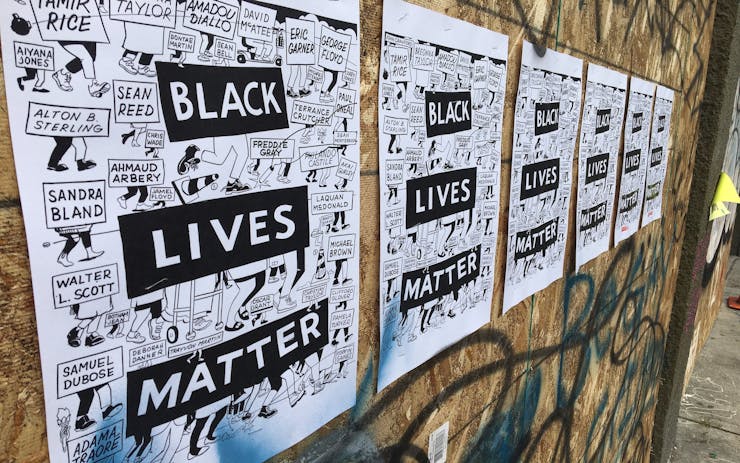As the outrage over the killing of Black Americans by police continues to pour into the streets, it’s also rising to the surface in the cannabis industry.
Now is the time to ask: Is your dispensary doing enough to bring about equality?
I and others in the industry are seeing and feeling the pressure inside dispensaries and grow operations around the United States.
While my heart is broken for the countless African-American men, women, and trans lives taken too soon, the issue goes beyond their unjust killings. Merely hashtagging #blacklivesmatter on your company’s Instagram is not enough. This is an industry built on the pain, incarceration, and death of Black Americans. Cannabis is political and the revolution will be live-streamed.
Now is the time to ask yourself: When the days of equality finally come, will you or your cannabis company have done enough?
Starting a change-making conversation
Last week I had a less-than-productive conversation with the owner and general manager of the dispensary I work at.
Race and gender discrimination are prevalent across the industry, and I find it to be intolerable.
I pointed out the inequality and discrimination not only in our own store, but in the cannabis industry in general. Race and gender discrimination are prevalent across the industry and I find it to be intolerable.
I’ve visited countless dispensaries and grow ops, and what is always apparent to me is how whitewashed this industry has become in its quest for legalization. Most of the staff members I see are male and white. This is especially true when it comes to ownership and senior management.
Data reveals the diversity gap
A survey conducted in 2017 by Marijuana Business Daily highlighted such inequities. They found that roughly 81% of dispensary owners were white. By contrast, only 4.3% of cannabis business owners were African-American. (According to the US Census, 76.5% of Americans identify as non-Hispanic white, and 13.4% as Black or African-American.)
I doubt that those industry numbers have changed much in three years. In fact, a survey published this week by the Denver Department of Excise and Licenses found that almost 75% of local cannabis business owners identify as white. Only 5.6% identify as Black. In the city of Denver, 10% of the population is Black.
That disparity is driven by an array of factors, including access to capital and criminal records. While many cities and states have taken steps to expunge nonviolent cannabis convictions, too many others have not. Many states have failed to regulate industry requirements and standards that would provide true equity and foster diverse ownership.
Bro culture still permeates the industry
The excitement of visiting a new grow op is unmatched, yet that experience becomes tainted when I see a lack of diversity—and by “diversity,” I mean Black people. I find it confusing that an industry built out of the pain and suffering of Black and brown communities finds no need to make reparations to said communities.
We see diversity in ad campaigns, on the sales floor, but rarely among managers and owners.
Legal cannabis as it stands is guilty of whitewashing African-Americans out of sight. While we can find some diversity in ad campaigns and floor and production staff, we will be hard-pressed to find this same diversity in ownership and management.
This seemingly impenetrable bro culture goes by another name: white supremacy. Racism is not always overt. In many instances it’s coded and deeply rooted in legislation, regulations, or company policies that keep many African-Americans at bay.
Shop highly rated dispensaries near you
Showing you dispensaries nearThis started in the 1930’s, when Harry Anslinger invented baseless evidence to demonize Black and brown communities. This theme continued through the war on drugs, through stop-and-frisk policies, and is still present in the form of licensing processes, ownership, and management. The cannabis community should be crusading to implement positive change for those communities most harmed by these past injustices.
Demanding action, not sympathy
Let’s be honest: The war on drugs was a war on Black people and Black communities. Remaining silent in this hour of need is a political act. If you are silent, you have chosen the side of the oppressor. Silence is violent and dangerous. It’s dangerous to the dispensary staff, to customers, to business expansion, and to communities at large.
The Black community does not need sympathy. We need empathy, support, and fair licensing practices to achieve a diverse ownership within the cannabis industry. We need our white peers and allies to educate and eradicate racism in hiring processes, career advancements in the workplace, and promotional advertisements. This can be done through proper HR and diversity inclusion training, as well as educating yourself about what it means to be anti-racist.
Five actions that matter
The work America needs to do starts here, in the workplace. Here are a few things than can be done right now in cannabis operations across the nation.
1. Diversity must include ownership and management, not just floor and production staff.
The majority of senior management in my dispensary is white and/or male. When we bring issues having to do with racism or harassment to senior managers, they have no understanding of our experience and therefore cannot appropriately react.
2. Listen to others whose experiences are different than your own.
We may live and work in the same city, in the same store, but our experiences are vastly different because of how others perceive us. That doesn’t mean my experience is wrong. That doesn’t mean my experience casts doubt or judgment upon your own. It means my experience is different, and true. Listen to it with an open mind.
3. Establish a path from entry-level positions to management.
Communicate this path clearly to all employees, and walk the talk. Promote from within based on merit and announce open positions publicly to the entire staff. Reflect on who is being promoted and who is not. Are they mostly men? Are they mostly white? Is tokenism at play in these decisions? Ask yourself why that is, and what might be wrong with your criteria or judgment.
4. Create an actual Human Resources department.
I cannot stress this enough. No matter how small your operation, you need a person responsible for HR within your company. Consider hiring a seasoned professional for that role, or promoting from within. That person should be properly trained; they are responsible for fostering a safe work environment for all employees. Ideally this role should be filled by a person of color who has a wider lens on racial inequities.
5. Understand who your customers are, and connect with the local community beyond advertisements or social plugs for the business.
If you’re operating in an urban neighborhood and your customers are mostly people of color, don’t pretend your ideal customer is a suburban soccer mom—especially if you (the owner or manager) are from the suburbs. Your “ideal customers” are not the only ones greeted on the sales floor. Your current customers actually are ideal because they choose to spend their money in your store and on your products.
Silence is not acceptable
This revolution is emotionally taxing to all participants, but it needs to be understood that simply living as a Black person in America has always been taxing.
I’m not telling you this just to make you uncomfortable. I’m speaking up because this is the reality of the Black experience. We’re scared to leave the house to go to work, because Black people are at risk every time we step into public space. We should feel safe at work. We should feel safe to do our work. And I am speaking up because silence is no longer acceptable.





